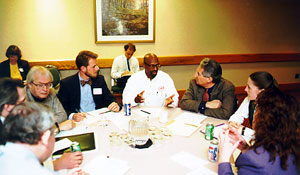Report Sections
Afternoon Session
mprBusiness Group
mprEducation Group
mprPros and Cons
mprEffects
The Morning Breakout Sessions
After the Socratic dialogue, participants in the symposium met in small groups to discuss these same questions in greater detail. There it became clear that people's views on the symposium's principal question - Is religion too far in the shadows of American public life? - depended in large part on their own experiences and their role in public life.
 |
Others, however, agreed. An educator, for example, noted that religion has been all but banished from the public schools. Problems can arise, a judge noted, when religious doctrine influences a person's actions yet remains hidden: in that case, he thought, it should not remain in the shadows.
Religion clearly informs and colors his values, the judge said. His Christian upbringing, for example, taught him to believe in the possibility of redemption, and by extension that criminals can change, so religion deeply influences his attitude towards sentencing. But for lawyers and judges, especially, he thought it important that religion not move to the foreground.
Several participants in the symposium drew sharp distinctions between faith and doctrine, between individuals and institutions. Individuals must be guided by their faith and convictions, they said, but neither they nor the institutions to which they belong should be allowed to impose their doctrine on others. "When ideology comes into it, rather than faith, it divides people," one said.
Some participants expressed concerns about how minority religions would be treated. A Quaker woman worried that the stories of her faith would be forgotten or ignored. A Jewish man described how his son had come home from public school in the 1950s singing "Jesus Loves Me."
Many thought expanding religion's role would have a positive impact - that it would teach values to children and help adults integrate their spiritual lives and work, that it would promote tolerance and provide a framework for making moral decisions, that it would raise the standards of public discourse and bring a sense of optimism into public life.
Many wondered how the expanded public dialogue about religion would work. The primary goal of The Public Religion Project, one man suggested, should be to devise "rules of engagement" that allow for a constructive dialogue. A Unitarian showed just how difficult this might be: devout Christians, he said, cannot accept his value system because he does not believe Jesus is the Messiah.
Throughout these wide-ranging discussions, several other common themes emerged:
- Since the Vietnam War and the Civil Rights Movement, liberals have for the most part ceded the arena of public religion to conservatives.
- What usually passes for public discussion of religion in the U.S. today is not really dialogue; rather, strident voices yell loudly (and the strident stick bumper stickers on cars) in an attempt to shove their beliefs down other people's throats.
- Elevating the quality of public discourse about religion would itself be a good thing; talking honestly and openly about religion and its effects is better than keeping it hidden in the closet. "Right now, religion often plays a negative role in public life," one woman commented. "If our public dialogue about religion were more intelligent and respectful, religion would not have so much power to be destructive. It's often used as a club. It should be used differently."
"Profoundly religious people," another commented, "are hopeful."